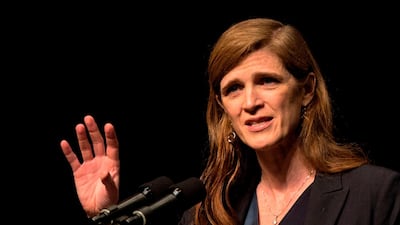President Joe Biden’s nominee to oversee and revitalise the US foreign assistance apparatus is set to face her Senate confirmation hearing on Tuesday.
A former ambassador to the United Nations, Samantha Power is an unusually high-profile nominee to lead USAID, the anti-poverty agency that delivers foreign assistance to more than 100 countries around the world.
Her nomination comes as the Biden administration seeks to reinvigorate US economic and humanitarian assistance throughout the world after former president Donald Trump sought to drastically slash the USAID budget for four consecutive years.
“Samantha Power is a world-renowned voice of conscience and moral clarity — challenging and rallying the international community to stand up for the dignity and humanity of all people,” Mr Biden said in a January statement upon announcing his intent to nominate her.
“I know first hand the unparalleled knowledge and tireless commitment to principled American engagement she brings to the table, and her expertise and perspective will be essential as our country reasserts its role as a leader on the world stage.”
Ms Power, 50, an Irish-American academic and author of a Pulitzer Prize-winning book about atrocity crimes, called A Problem from Hell: America and the Age of Genocide, said on Twitter she looked forward to heading the $41 billion budget agency.
“As a journalist, activist, and diplomat, I’ve seen the world-changing impact of @USAID,” Ms Power told her 247,000 Twitter followers.
“At this critical moment, I feel immensely fortunate to have the chance to serve again, working with the incredible USAID team to confront COVID-19, climate change, humanitarian crises, & more.”
As former President Barack Obama’s UN ambassador from 2013 to 2017, Ms Power worked on the fight against Ebola, the 2015 Paris agreement on climate change, tackling poverty and shutting down revenue streams for the so-called Islamic State.
Ms Power, an advocate of Western-led military interventions to stop atrocities, famously sparred with Mr Obama over the civil war in Syria, notably when her boss did not use force against the regime’s increasing use of chemical weapons in 2013.
She was instrumental in the 2014 UN Security Council decision to open four border crossings into Syria from Turkey, Iraq and Jordan to get aid into rebel-held areas, even while Damascus denounced this as a breach of Syria’s sovereignty.
Ms Power’s selection comes amid concerns over Mr Biden’s inauguration on January 20, and whether any impeachment proceedings against outgoing President Donald Trump over the US Capitol riot will upend Senate confirmation hearings for new cabinet picks.
While some of Ms Power’s critics dismiss her as an unrealistic do-gooder, much of the reaction to her selection on social media highlighted her as a guardian of human rights in the world's troublespots.
Janti Soeripto, president and CEO of aid group Save the Children, said Ms Power had a “long track record of giving voice to the vulnerable” and was an “excellent choice” at a time that “challenges for children around the world have never been greater”.
Stewart McDonald, a member of parliament for Scotland and the Scottish National Party’s spokesman on defence, praised an “excellent choice of a fine public servant” who was “always full of wisdom and insight”.


